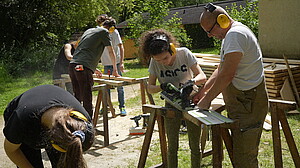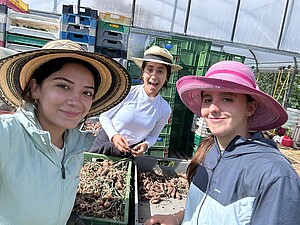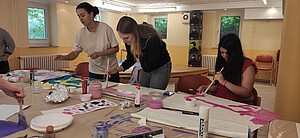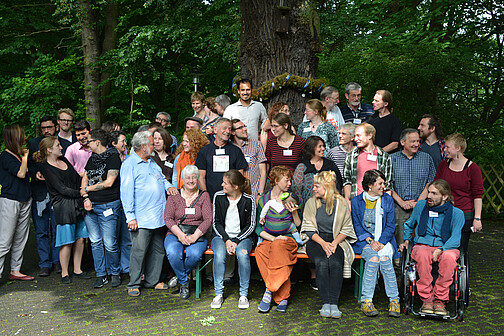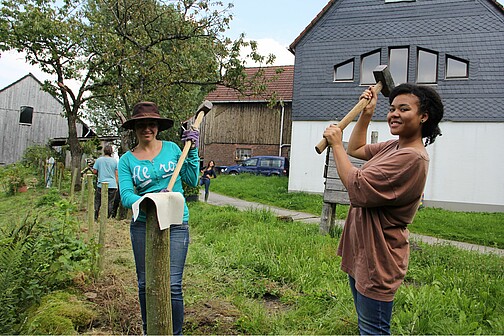
ICJA Workcamps in Deutschland
In unseren Workcamps könnt ihr euch engagieren in praktischer Friedensarbeit, im Umweltschutz und nachhaltigem Gärtnern, in Kinder und Jugendarbeit, bei Aktivitäten zugunsten der Integration benachteiligter Menschen, in der Renovierung und bei Festivals. ICJA legt Wert darauf, Workcamps zusammen mit lokalen Partnern auszurichten, die inhaltlich interessante Projekte anbieten: Initiativen und Orte, in denen vielfältige integrative, soziale und künstlerische Arbeit gemacht wird.
Die Bedingungen zu Teilnahme an Workcamps in Deutschland:
• Vermittlungsgebühr bei uns: 77,- Euro
• Reisekosten: entsprechend der Anfahrt zum Workcamp.
• Weitere Kosten fallen in der Regel nicht an oder werden in der Ausschreibung deutlich benannt
• Üblicherweise sind unsere Workcamps offen für Teilnehmende zwischen 18 und 26 Jahren, wir können Ausnahmen für Ältere machen
If you like to apply from foreign country for our workcamps, you need to apply through an organisation in your country. We can help you to find this organisation. Just send a mail to workcamps.in(at)icja.de
Die ersten Workcamp - Projekte vom Sommer 2026 sind unten zu sehen, es werden nah und nach noch weitere ergänzt werden
-
Hands-on in Community – “Future Village” Waldhof 17.05-11.06.2026
Hands-on in Community – “Future Village” Waldhof 17.05-11.06.2026
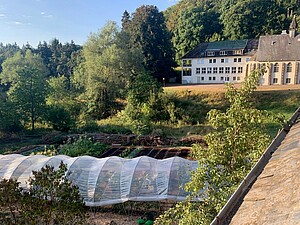
ENVI/CONS/SOCI
Vols: 12
Languages: English, GermanProject: Welcome to the Zukunftsdorf Waldhof - “Future Village”! This community, located in a former clinic site surrounded by forests, is a growing village of about 30 adults and 10 children with diverse backgrounds in fields such as therapy, medicine, IT, marketing, craftsmanship, agriculture, performing arts, education, and NGOs. Since 2019, Waldhof has been a hub of sustainability, cultural projects, and social engagement. The community follows democratic principles, fostering a participatory and cooperative way of living. For further information, see the website: https://zukunftsdorf-waldhof.de/
Work: Volunteers will experience life in this vibrant community while supporting various hands-on projects. You will be joining us in renovation work on our buildings and be part of this exciting "participatory construction site." Besides renovation work, volunteers will help with landscape maintenance, gardening, and preparing communal lunches alongside the residents. So, mostly it is physical work with tools used in construction sites.
Study part: Waldhof is deeply committed to sustainability and environmental education, offering an inspiring place where people and nature interact harmoniously. Volunteers will learn about sustainable community living, sociocratic principles, permaculture-based ecological gardening, care for buildings and practical landscape maintenance while engaging in meaningful work that directly contributes to the village’s growth and mission.
Environment: Zukunftsdorf Waldhof is located in a peaceful, rural setting, surrounded by forests and nature. Within 3 km range, you’ll find an old castle and a beautiful reservoir lake, perfect for walks, hiking trips, and outdoor relaxation.
Leisure Time: There will be plenty of opportunities to explore the beautiful natural surroundings, take long walks in the forest, visit the historic castle, or swim in the nearby reservoir lake. Volunteers will also be welcome to participate in community-organized activities such as fireside music, creative workshops, and social gatherings.
Accommodation & Food: Volunteers will stay in a simple mattress dormitory shared across multiple rooms. A kitchen will be available for the participants to prepare their own breakfast and dinner, while lunch on workday s will be cooked and enjoyed together with the community .
Remarks: This project requires moderate to good physical fitness and a willingness to engage in hands-on work. Previous experience in construction, renovation or gardening is helpful, but not required. Volunteers should bring sturdy work clothes that can get dirty, solid shoes, and a sleeping bag. After registration, we require a self-declaration concerning the children and youth protection.
Terminal: Katzenfurt, near Giessen, closest airport Frankfurt am Main.
Join us for two weeks of community living and hands-on meaningful work while experiencing the unique culture of the Zukunftsdorf Waldhof!
-
Making Furniture in the Forest Darmstadt 27.06 - 11.07.2026
Making Furniture in the Forest Darmstadt 27.06 - 11.07.2026
CONS/MANU/ENVI
Vols: 12
Age: 18-26
Languages: English, GermanProject: Jugendhof Bessunger Forst e.V. is a non-profit children's and youth centre and one of the oldest self-managed establishments in Germany. Situated in the forest on the outskirts of the city of Darmstadt, we maintain the tradition of a place of learning and leisure close to nature and life with down-to-earth, resource-saving accommodation. For over forty years, groups of children, young people and adults, families, clubs and political initiatives have been coming together here and finding plenty of space to learn, run around, play, relax, meet, develop or simply be outdoors and be together. In spring and summer, we open the “ForstLove Café” on Sundays with a colourful musical programme. Day trippers, city travellers and fresh air fans can relax here in the green idyll of the large grounds. Our offer is aimed in particular at families and people on low incomes and the appreciation of heterogeneity and diversity is very important to us. You can find Jugendhof on the Internet: jugendhof.org.
Work: Once again this year, a craft project will be the focus of the work camp. Together, we will plan and implement practical construction projects for the site, such as building furniture for the group accommodation or constructing ramps and other structural elements to make the centre more accessible. This involves sawing, drilling, screwing and hammering –under expert guidance and with professional tools and machines. No previous craftsmanship skills are required; what is important is an interest in practical work, team spirit and the desire to create something lasting together.
Depending on the course of the project, the group may also become socially active. This means that individual craft projects will not only take place at the youth centre, but may also benefit other inclusive projects and initiatives in the neighbourhood. In this way, your work will support local institutions or groups and contribute to strengthening inclusive structures in a very concrete way.
We are delighted that a group of young people from the region with different disabilities and abilities will be part of the project. Together with the international volunteers, we are forming small teams that can support each other, learn from each other and grow together in the tasks. These mentorships enable an inclusive exchange in which everyone can contribute their individual strengths. Our aim is to create an open and respectful atmosphere in which all participants can actively take part in the work camp and gain new experiences.Leisure time: The Jugendhof is located on the edge of the Bessunger Forest, which is easy to explore from here. On hot summer days, the shady forest offers a good opportunity to cool off and the wide-open meadows invite you to enjoy a relaxing picnic. You can enjoy meetings in a wooden yurt, which was built from an international workcamp as well. An hour's walk through the woods and meadows takes you to a beautiful bathing lake with a small sandy beach. Darmstadt is also very interesting culturally, as it was one of the centres of European Art Nouveau at the beginning of the 20th century. The “Mathildenhöhe Artists Colony” in Darmstadt has been a UNESCO World Heritage Site since 2021. We highly recommend a visit to the impressive and unique site, including the museum and the Orthodox chapel. Fancy more action? Then visit the climbing park high up in the trees with its very different levels of difficulty.
Region: Jugendhof Bessunger Forst e.V. is located on the edge of the forest between the city of Darmstadt and the village of Roßdorf. The suburban area marks the transition from the Rhine-Main region to the Odenwald low mountain range and is located 30 kilometres south of Frankfurt am Main and 50 kilometres north of the picturesque city of Heidelberg.
Accommodation: The volunteers live in our centrally located self-catering house ‘Sharewood Lodge’. In addition to a spacious kitchen and two bathrooms, there are three bedrooms in the house, each with five beds (maximum six). In general, the buildings on the extensive grounds allow for all-day outdoor living.
Remarks: After registration, we require a self-declaration in terms of legal protection for children and vulnerable persons. You will need working clothes, rainwear and if you like swimming gear as well as sturdy closed shoes. Since it can get very cold in the forest at night, even in summer, please bring warm clothes and don't forget your sunscreen. Bed linen will be provided by the house. Please bring your own towels.Terminal: Bus station Bessunger Forst/Jugendhof reachable from Darmstadt Main Station or Darmstadt Ostbahnhof. Nearest Airport: Frankfurt / Main.
-
Market Gardening in Tunsel 25.07. - 08.08.2026
Market Gardening in Tunsel 25.07. - 08.08.2026
AGRI/ENVI/ STUDY
Vols: 08
Age:18-26
Language: English, German & Spanish
Project: Michels Kleinsthof is working towards the utopia of a sustainable, resilient, and grandchild-friendly agriculture becoming reality. More than 50 different crops are grown on one hectare using the “Market Gardening” principle. We are part of the movement “Community based agriculture” (in Germany, this is called “Solidarity Farming — Solidarische Landwirtschaft”). This means members are involved in the work on a weekly basis to bring sustainable food production to the people. School classes are allowed to experience agriculture firsthand and enjoy looking after chicken, sheep and bees.
There is a great variety of tasks in our diverse garden! Diversity makes us independent of the agricultural industries. It also benefits our fellow creatures of all kinds.
We deliver a large portion of our products to our 90 Solidarity Farming members, while another part is sold at the market in the picturesque nearby town of Staufen.
However, Michel's micro-farm sees itself not only as a food producer, but also as a place of learning and a nature conservation project! Agriculture is the number one cause of species extinction worldwide and is responsible for 25% of climate-damaging greenhouse gas emissions. On one of the most fertile soils in Germany, nestled in a beautiful spot between the Vosges and the Black Forest, the micro-farm sets a counterexample to the monocultures of the rest of the Rhine Valley.Work: Your help is needed for various construction projects! Among other things, we are renovating our earth cellar using the light clay construction method. The aim is to create more space for vegetables and achieve better insulation. We would also like to build a small hobbit house in the ground for our team, again using the light clay construction method and natural log technique, to create a cool place for lunch breaks etc. in summer. Another manual labour will be to renovate other facilities on the farm.
In August, every garden is in the fullness of its harvest season!
Tomatoes sweetened by the sun, courgettes and cucumbers growing at a fast speed and need hard-working hands and hungry mouths. But the weeds don't stop growing either. That's why there will be the opportunity to help out in the daily business of Market gardening like harvesting, weeding, planting seeds and caring of small plants in the nursery all the time! In other words, there would not only be the opportunity to experience the multifaceted gardening at first hand, but also to master manual and physical work in a team. So if you have extra energy, you are more than welcome!
Study part: In our work, we follow the principle of “Market Garden”: Here is what it looks like: on the smallest possible area, as many crops as possible are cultivated without the use of groundwater-damaging fertiliser, only with the help of compost. The most important idea here is recycling, in order to work with as little labour, pesticides and land as possible. Learning gardening skills, the cycle concept and environmental aspects in agriculture are therefore important learning elements during the work camp. Permaculture and biodynamic principles can be experienced here. The care and feeding of chickens and sheep can also be learned in practice. Another important part is building with natural materials. We plan to implement old craft techniques that were used to build houses and infrastructure without modern technology, yet were very energy efficient.
Accommodation and food: Most of the organic seasonal food comes directly from the field to your plate. Everything else that is needed will be purchased. The diet will be predominantly vegetarian. Cooking will take place together in the outdoor kitchen and there will also be the possibility to cook a "classic" dish from your country of origin. Next to the kitchen, there is also a fireplace for sitting together in the evening, so your musical instruments are most welcome! We will also use the clay oven for pizza at least once.
As far as sleeping is concerned, we will either set up a communal tent directly on the field or provide some beds in construction trailers. A small hutch will serve as our shower, a composting toilet is already part of the sanitary facilities in the field.
Please be ready to live in very basic conditions; you will live outdoors most of the time and close to nature. The work can be physically demanding.Region: Michels Kleinsthof is located between the Black Forest and the Vosges in the border triangle in one of the most beautiful regions of Germany. A nearby quarry pond can be easily reached after work with bicycles provided by the farm and the young, alternative and beautiful student city of Freiburg is also less than 10 minutes away by train. The farm itself is located in a small village called Tunsel, but the entire region is bursting with nature and cultural tourism opportunities. If you are travelling by plane, we would very much appreciate it if you could extend your stay in Central Europe even further, so as not to use climate-damaging mobility just for our project.
Remarks: Please bring a sleeping bag, swimwear and preferably sturdy shoes for working in the garden. Please note that you will get dirty in the garden, so clothes that can get dirty and are old are recommended.
Remember that the sunshine could be strong and you should bring suitable headgear and sufficient sun protection. Long-sleeved, thin clothing will also work for this.
The living conditions will be very simple, so please be prepared. Note that it is not recommended to attend if you are allergic to weed.
Terminal: Bad Krozingen, near Freiburg. Nearest airports: Basel, Stuttgart -
Horses and Ponies Farm Kleinkatern 01.08. - 15.08.2026
Horses and Ponies Farm Kleinkatern 01.08. - 15.08.2026
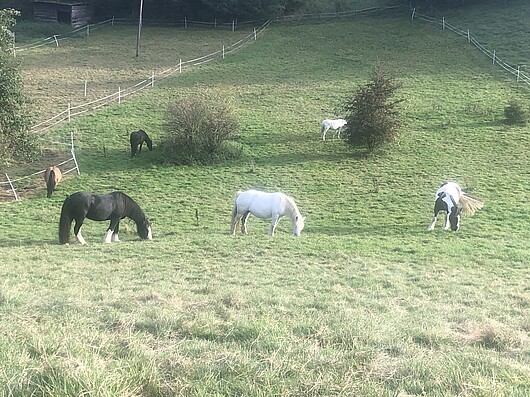
AGRI / ENVI / ARCH
Vols 12
Age:18-26
Languages:English and GermanProject: Lichtpferdehof is a small community with 8-9 horses and ponies, founded in summer 2023. Four adults take care of the small farm with horses, dogs and cats. Three of our horses are therapy horses and are mainly used with children. Unfortunately, we cannot offer the horses for riding. We have many meadows and a small field for self-sufficiency.
It is important to us that we are in harmony with nature and all visible and invisible beings. We create places of silence and contemplation but also places to celebrate.
Our farm is a 10-minute drive from the nearest town and more than an hour's walk away.Work: We would like you to join us at an international camp to help us improve shelters on the horse fields, build fences around the meadows and tidy up some invasive plants, and help with our small, self-sufficient field. You can also do some creative work, painting some signs, walls etc. You can also learn about our work with the horses, e.g. grooming, feeding, walking, or perhaps helping with therapy with children.
Some jobs require a lot of physical effort, but you can learn many new skills. We work about 3-4 hours every morning, and after lunch and a break, we continue working another 2 hours. On some days we offer excursions, e.g. to the lake, a castle or a small town. Saturday and Sunday are free days.
During the 2nd week you will be experiencing helping on an organic farm with cows, sheep and chicken that are kept in very human way. There you can help with more meadows that show a plant life with some rare plants. This farm looks after the meadows with principle of holistic grazing and thus helping plant life and animals equally. Harvesting and Distribution is organised according the principles of “community based agriculture”.There is also paint work to be done and garden chores.
Study: Volunteers can gain a small insight into a small, young community and how it is organised. We are happy to show you how we consider our animals and the nature around us as equal living beings. Our horses are our very special partners at work, so we provide them with the most species appropriate husbandry possible. You are also welcome to gain an insight into the equine language.
We begin the day with a small spiritual ritual.We will also visit the larger organic farm in the neighbourhood as mentioned above.
Accommodation and food: We have various options for accommodation. If the weather is fine, you will sleep in 3-4 person tents with tarps in the garden. In bad weather, there is a large room where everyone can sleep together. Please bring warm sleeping bags and sleeping mats. It is essential that you bring mosquito repellent, as we have a lot of mosquitoes. Please also remember to bring rainwear and sturdy, waterproof shoes. In our area, it can rain even in summer and it can be chilly. The garden also has an outdoor kitchen, and meals are mainly eaten outside. With our help, the volunteers will prepare the food from mostly certified organic vegetables and fruit. The food will be mainly vegetarian and vegan.Region and leisure time: The Lichtpferdehof is located in the region called “Bergisches Land” and is near a small, beautiful castle town (Hückeswagen) and an old castle, 'Schloss Burg', nearby. A little further, but easily accessible, is the lovely cathedral city of Cologne. A large lake is relatively close by, which is great for swimming when the weather is nice. Please bring swimwear. We can sit around a campfire in the evening and admire the starry sky.
Remarks:This camp is perfect for nature lovers and anyone who love to get in close contact with animals. Please bring warm sleeping bags, sleeping mats and swimwear.
It is important that you bring mosquito repellent, as there are many mosquitoes.
Please also remember to bring rainwear and sturdy, waterproof shoes. In our area, it can rain even in summer. After registration, we require a self-declaration concerning the children and youth protection.
Terminal: Remscheid/Lennep train station. The closest airports are Düsseldorf and Köln (Cologne) /Bonn.
-
Peace Center In Sievershausen 03.08.- 17.08.2026
Peace Center In Sievershausen 03.08.- 17.08.2026
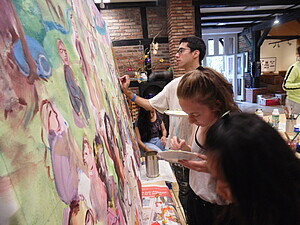
RENO / STUD / ART / PEACE
Vols: 20
Age: 18-26
Language: English, German
Project: The Peace Studies Center in Sievershausen (Antikriegswerkstatt Sievershausen) was established in the premises of the Sievershausen Lutheran C hurch community mor e than 50 years ago. During that time, the Vietnam War escalated and the Antikriegswerkstatt was part of a global movement against the war. Nowadays there are several buildings, including a guesthouse and the well-known "Anti-War House" with an assembly hall for our events, located in a park-like area along with a church older than 1000 years on the edge of the village. The peace center shows through its diverse program, that peace work has political, historical, educational and cultural aspects. Throughout the year one can visit exhibitions, readings, lectures and many cultural events. The peace education offers of the seminar area include teaching units, trainings for school classes and church groups on current and historical topics.
Manual and Creative Work: The Peace Studies Center is located on the edge of a former battlefield. An exceptionally bloody battle took place here on a Sunday afternoon in July 472 years ago. Analogous to the well-known motto "swords to ploughshares" we redesign this to "battlefields to playing fields". The participants of the work camp will continue last years’ work and design different elements of this playing field. Our main item this year will be Constructing of a 3x3 basketball court including the construction of a backboard with a hoop holder. This means manual work with wood, metal, earth and colour and some gardening. Anyone who appreciates creative work can work on a video or painting project under expert guidance, which is to be developed on the topic of political and social upheavals that concern us worldwide.Study part: You will learn some essentials of peace work and receive basic training in non-violent conflict management by professional trainers. Moreover, the respect for Human Rights und circumstances of war and climate change is being discussed. We will visit the memorial in the former Bergen-Belsen concentration camp. There will also be a chance to learn about working with young people in a nearby youth center. Volunteers will have the opportunity to meet young people and families in the region, the group will also invite people of the village and region to an “Evening of encounter” (Abend der Begegnung) at the Peace Center.
Leisure Time: For the leisure time, the group can use facilities of the seminar house, the little parc around and take part in excursions to Hannover and Braunschweig.
Accommodation: The accommodation for the participants is offered in rooms with four beds each. There are bed sheets available. Food is prepared together in the kitchen of the seminar house.
Region: The Peace Center is at the verge of a village with about 2500 inhabitants. Sievershausen lies 30 kilometers east of the Lower Saxony provincial capital Hannover on the freeway to Berlin.
Remarks: You have the chance to get to know many aspects of peace: an interest in the topic and active participation are desired.
Terminal: Haemelerwald near Lehrte (train from Hannover to Braunschweig), 3 km from the Peace Center.
-
Universitas in Farmhouse Gossberg 10.08-24.08.2026
Universitas in Farmhouse Gossberg 10.08-24.08.2026
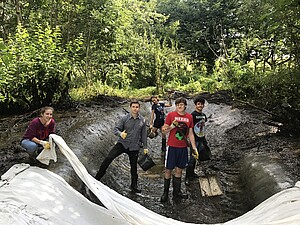
AGRI/CONS/ENVI/STUD/MANU
Vols: 12
Age: 18-26
Language: English, GermanProject: The "Universitas in Farmhouse" is a place of education for nature, culture, youth work and sustainability. The aim of this project is to demonstrate different ecological cultivation methods. It is a long-standing partner of successful workcamps and a wonderful place to feel at home. Besides the topic of permaculture, the host likes to offer rooms for musicians.
Work: Volunteers are invited to continue the project GARDEN OF ENVIRONMENT – FIELDS for PLAYING AND LEARNING on our gardening land. It will offer different stations where visitors can learn about and experience nature and sustainability … very creative, surprising and funny! Volunteers will support the host in their garden, construction, and landscape design work. There will be physical work, using tools and working with materials like wood, rocks, and soil. You will work outdoors most of the time. Last year, a pond was created with the help of the volunteers! Volunteers who like to exercise can chop firewood. Every year, volunteers are invited to get to know the local permaculture garden and do some gardening there. While looking after the plants, there is the possibility to harvest fruits. Therefore, we are looking for 12 motivated young people who are interested in handicrafts, advanced training, and gardening/landscaping.
Study part: Volunteers will get some insight into the principles of permaculture for example: how to create a productive garden which grows plants and feeds animals in a way that only a minimum input of energy and resources is required to achieve maximum sustainability for the environment. Interesting ecological and cultural projects/information from your country are very welcome.
Leisure time: The afternoons, evenings and weekends are free for personal use: sports, fieldtrips in the region and to Freiberg, swimming.
On the last Saturday, volunteers will attend a concert in the farmhouse: Musician HANS DIE GEIGE (a really great musician from Berlin will perform his atmospheric music www.rockgeiger.de).If you are talented as well, bring an instrument with you drums and guitars can be provided.
Region: The project will take place in a famous river hill and cultural landscape in the middle of Saxony at the foot of the Erzgebirge (“Ore Mountains”), 35 km from Dresden, 15 km from Freiberg.
Accommodation: The participants are accommodated in the big seminar room. Food will be prepared together in the big kitchen of the seminar house.
Remarks: Please bring a sleeping bag with you and an insulating mat. Gossberg is situated in a remote area; you can enjoy nature and the countryside.
Terminal: Freiberg, near Dresden. Nearest airports: Berlin, Dresden, Leipzig -
FoKus Festival – RABRYKA in Goerlitz 11.08. - 25.08.2026
FoKus Festival – RABRYKA in Goerlitz 11.08. - 25.08.2026
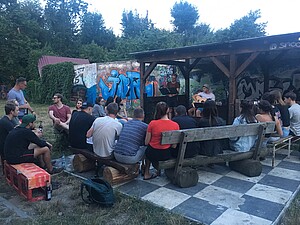
FEST/ ART / MANU
Vols: 10Age:18-26
Languages: English, German
Project: "RABRYKA" is a unique space for youth culture and social life, situated in an abandoned factory ground. You can see it as an open space for all kinds of youth and social culture. Currently it offers a wide range of possibilities for kids, youth and adults: it unites different projects in one house, e.g. a youth club, a workshop and makerspace, intercultural or cultural education or urban gardening. There is enough inside and outdoor space for gatherings and sports, sharing things and opinions, playing music and partying together and … much more!
The biggest event organized by the RABRYKA is the FOKUS Festival, in which you will also participate.
The head organisation of the RABRYKA is the “Second Attempt e.V.”, which highly motivates people to develop the civil society of Goerlitz. Everyone is invited to join meetings that focus on the vision of a society, which respects the values of tolerance, equality and cross-cultural empathy. RABRYKA is a fictional word connecting the Polish word for factory – fabryka and the first letter of red. Red are the bricks of the buildings of the former factory.
Work: Your help is needed to p repare space and facilities for the 19th Fokus Festival. An alternative 2-day festival (21st – 22nd August) with several stages, many workshops, a speakers corner, food and drinks! Please watch one of the aftermovies to get an impression of the Festival. You are invited to work together in international teams, composed of employees of RABRYKA and other volunteers from Goerlitz. During working hours (9 a.m.-5 p.m.) you can create fancy furniture for the visitors, colorful decoration for the stages and the festival area, do some gardening or lead through your own ideas. It is not required that you are experienced, but it is needed that you are interested in doing handcrafted work and that you are really motivated to become part of our preparation team and to support us reliably!
Whether you like crafting, working, gardening, cooking or designing- whatever you like, we’ll find a task for you. It would be great if the group could contribute something special for the Fokus Festival, for example decorating a graffiti wall. During the festival itself volunteers will offer support by filling shifts at the bar, the backstage control or as a runner. For further information of the Festival and the Camp, please visit our Website, Instagram.
Study and leisure time: Goerlitz is situated at the very east of Germany. After WWII, it was divided and the area in the east of the river Neisse is now the autonomous town Zgorzelec and part of Poland. Volunteers will get a guided tour through Goerlitz and will learn about its eventful history. Moreover, you will learn about the current network of initiatives in the city, which offers a wide range of cultural and social work. In addition, there will be free time for a cycling tour to a lake nearby, bonfire evenings, a party and more.
Accommodation: Volunteers will stay near the youth and cultural center. The group of ICJA volunteers will sleep in a big room with room dividers. There are bathrooms, a shower, and a kitchen. Volunteers will need a sleeping bag. It is planned that volunteers will prepare dinner on their own. Breakfast and lunch will be offered at RABRYKA, and will be vegan.
Remarks: Volunteers who are skilled in handicraft and creative arts will enjoy great atmosphere to express their talents and abilities. Please bring a sleeping bag, a pillow (if needed), work clothes (for warm, cold, and rainy days), a bathing suit, sturdy shoes, and whatever you need for yourself. There is no washing machine at RABRYKA, but a laundromat is 10 minutes away. After registration, we require a self-declaration concerning child and youth protection.
Terminal: Goerlitz train station. Nearest Airports: Dresden, Berlin and Prague.
-
Encountering in Herford 15.08.- 29.08.2026
Encountering in Herford 15.08.- 29.08.2026
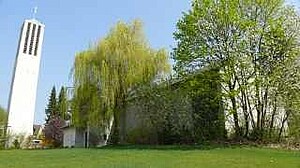
MANU/CONS/SOCI
Vols: 12
Age: 18-26
Languages: English, German
Project: Herford is a small town with a rich historical culture. In the Middle Ages, Herford was an important spiritual and intellectual centre and one of the best-fortified German cities. The cityscape is still characterised by buildings that bear witness to various historical eras. Host of this workcamp is the Protestant Community Center “Haus der Begegnung” - "House of Encounter“. They are very committed to supporting migrant families, their integration into urban society and the appreciation of diversity. The House of Encounter offers people from different backgrounds and cultures a place to meet. The encounter between different generations and cultures will be the central issue of the workcamp.
Work: We will carry out work in the house and garden: an archery range will be created, paths will be improved, and the floor in the house will be renovated. A gardener will assist us with the work in the garden. Volunteers will mostly be doing physical work outdoors.
Study part: We will meet each other and other people: A workshop on conflict de-escalation and civil courage is planned. We will learn about German culture and history in museums – we will visit a zoo and an old castle in Bielefeld. We will meet different generations: the children in the neighbouring kindergarten and older people, who will tell us their stories.
Leisure activities: There is a large common room with a pool table, kicker table and a cozy sofa corner. We organize a trip to the outdoor pool and have access to a sports field.
Accommodation: Volunteers will sleep in different rooms in the large house. You will need to bring sleeping bag. Showers are available in the neighbouring house.
Remarks: Smoking and drinking alcohol are not permitted in the centre. Please bring workwear and raincoats, a sleeping bag and a bathing suit.
Terminal: Herford Main station, nearest airports: Hanover and Düsseldorf.
-
I have a Deam in Datteln 15.08-29.08.2026
I have a Deam in Datteln 15.08-29.08.2026
ART/STUDY/CULT
Vols: 12
Age: 18-26
Languages: English, German
Project: Commemorating as a way towards peace! The Evangelical parish of Datteln is the origin of a Christian Peace Movement, which builds up a European network for international encounters and voluntary service as a contribution to peace. The project is based on a historical event that happened after World War I, during the French occupation of the Ruhr area. On Good Friday in1923, in the Lutherhaus (former parish center), the French lieutenant Étienne Bach and the German official Karl Wille chose reconciliation instead of conflict. Their meeting became the beginning of the movement “Youth Action for Peace (YAP)”. Since then, many volunteers from different countries have learned that reconciliation is possible, even when conflicts seem very difficult to solve.Work: Each week has a different focus:
Week 1 – Artistic work : Volunteers work on creative art projects around the topic of peace. The artworks will be shown publicly later. In previous camps, volunteers created, colorful peace messages, “benches of encounter”, a “table of peace and reconciliation”, a large mural in a local kindergarten. With the support of the local artist Ulrike Speckmann, volunteers will paint and design together. This year, the artistic inspiration comes from Martin Luther King Jr.’s famous “I Have a Dream” speech. For information about the artist, please visit her site www.toefte.de/ulrike/index.html
Volunteers are invited to express their own dreams and visions for the future on a large cloth, which will later be displayed in the church.Week 2 – Social and outdoor work; Volunteers help renovate and beautify the outdoor area of the social center „Ev. Johanneswerk“, which supports adults with mental disabilities. The work includes gardening and simple renovation tasks. Friendly contact with the residents is welcome and encouraged.
Study part: Volunteers explore how “peace“ can be expressed through art.Local history is used as an example of how an international peace movement began.
Members of the parish are happy when volunteers interact with different social groups, especially children and elderly people.Leisure time: Excursions to local places of interest, like crossing 4 channels and other sites.
Region: The town of Datteln has approx. 35 000 inhabitants and is situated on the edge of the mining region in the north of the Ruhr area. Four waterways for shipping traffic are crossing in Datteln. The river Lippe and Münster region are nearby. Next bigger towns are Recklinghausen, Dortmund and a very nice and famous student town Münster.
Accommodation: The participants will be accommodated in the modern community center of Datteln „Etienne-Bach-Haus“. Please bring with you a sleeping bag. Camp beds and pillows will be provided.Remarks: Volunteers with interest in creative arts and social work are very welcome. After confirmation of placement in this camp, you will have to sign a self-commitment statement in terms of legal protection for children and vulnerable people. Please bring a sleeping bag.
Terminal: Castrop-Rauxel, (near Dortmund train station) Next airport: Duesseldorf International (80 km).
-
Past, present and future for Jamlitz Railway station 15.08. – 30.08.2026
Past, present and future for Jamlitz Railway station 15.08. – 30.08.2026
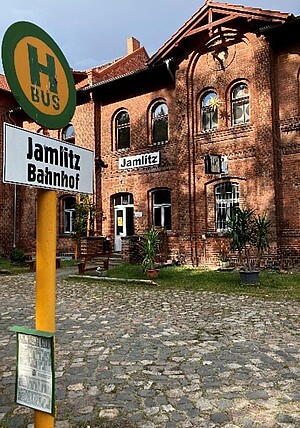
MANU/STUDY
Vols 15
Age: 18-26
Languages: English, German
Project: The “Justus Delbrück Haus” | Akademie für Mitbestimmung (Academy for Co-determination) in the Railway Station Jamlitz is an open place where everyone is welcome and can take part in events such as exhibitions, cinema evenings and other events. The organisation Karuna e.V. (Future for children and young people in need) bought the disused railway station in Jamlitz in 2008 and transformed it back into a lively place. Several organisations are now working together here, filling the past, present and future with life. You will find both a historical site rich with stories to tell and a vibrant space for exchange, where, in addition to educational programmes, leisure activities also take place. Moreover, a residential community for former homeless and decoupled young people has been established. In cooperation with the Lieberose memorial site in Jamlitz, socially disadvantaged children and young people in particular get the opportunity to escape everyday life, take advantage of artistic, historical and experiential educational programmes and experience a democratic and self-determined life. The railway station is located far away from large cities and is surrounded by forests and lakes, meadows and fields. This is very conducive to working with the young people and is part of the educational concept. “Arrive and simply be in the here and now”. This is the motto for working and living at the Railway Station Jamlitz. For further information see also Justus-Delbrück-Haus.
Work: With your help, we would like to carry out urgent work to preserve the historic railway station site. Nature is reclaiming what once belonged to it and working against memory. Together with your help and the support of the village, we want to fight against oblivion and make the station grounds visible again. The work you carry out will take place outside and is mostly horticultural: this means physical labour with hoes, saws and spades to clear the site of wild growth and bushes. Work can be physically demanding!During the work you will have the opportunity to learn a lot about the place and to talk to the local people and hear how they perceived the different periods. The Jamlitz railway station is also run in cooperation with the nearby Lieberose Memorial in Jamlitz and the young residents are often involved in its upkeep.
You can also become active at the memorial site and help to maintain the greenery and work against forgetting.
In our bicycle workshop, you can repair bicycles and take them on trips to the nearby Schwansee lake and through the meadows and forests.
Beside the work at the station and its surrounding we will care about the youth center Lieberose and prepair the summer party there. Together with the young people from Lieberose, Jamlitz and these area we celebrate a big event on august 22 with live bands, food truck and workshops.Leisure and study programme: Jamlitz is situated in a very rural location and has many exciting things to offer in addition to relaxing nature, bathing lakes and a historic landscape that can be explored on foot or by bike. At the end of the 19th century, Berlin artists discovered this place and founded an artists' colony, which still characterises the identity of the village today. During the National Socialist era, a large military training area was to be built here. The project met with resistance from the local population and was never completed. However, a satellite camp of the Sachsenhausen concentration camp was built, which sadly earned the village a reputation as one of the most important sites of the Shoah in Brandenburg. After liberation from National Socialism, both the camp and the military training area continued to be used by Soviet troops. The railway station was at the centre of all these events and today bears witness to the different areas.
You will have the opportunity to get to know the history in various ways. On guided tours and seminars, through conversations with locals and explorations on your own, you can uncover and understand the overlapping layers.We also think together about which excursions and activities can be organised. Whether to visit Cottbus, Eisenhüttenstadt or Berlin is up to you.
Accommodation: Volunteers will be accommodated in the former railway station, there are rooms with several beds, sleeping bags or bed linen must be brought along. We will cook and eat together with the residents of the railway station. If you want, you can spend the night in a tent, we can set up tents for this purpose.
Remarks: Please bring a sleeping bag, towel and possibly a pillow with you. You will need work clothes, rain gear and sturdy, closed shoes. As it can get cold at night in August, even in summer, please bring warm clothing. Don't forget sun protection in case of strong sun. For your free time, please bring a swimming costume, music, your talents and something specific from your life. The project is in a very rural location. There is a swimming lake about 15 minutes away by bike. Volunteers should be able to cycle and swim safely. Alcohol and drugs are not permitted in the project itself. After registration, we require a self-declaration on child and youth protection.
Terminal: Bus station “Markt Lieberose” via Trainstation Cottbus
-
Cultural center in Countryside Bedheim 26.09.-10.10.2026
Cultural center in Countryside Bedheim 26.09.-10.10.2026
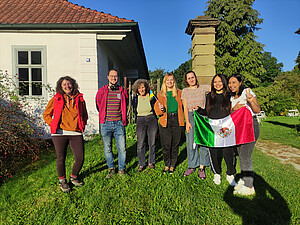
RENO/ ENVI/ STUDY
Vols: 12
Age: 18-26Languages: English, German
Project: Bedheim castle was first mentioned in the year 1169 and was destroyed and reconstructed several times in its long history. During the last 30 years, the castle has become a sociocultural center for this remote region. Currently, it offers meeting places for social and cultural initiatives. With historical rooms, the garden café, various types of gardens and its location surrounded by beautiful nature, it is a perfect place to meet with friends, enjoy a good piece of cake, or spend holidays. There are small concerts and exhibitions now and then and one flee market taking place. You also can play table tennis and football.
Since 1992, the association has been organizing workcamps. Volunteers enjoy spending their time meeting and work together with the inhabitants. An organic garden, and an architect's office are the basis for the existence of the residents. If you like a simple analogue life with a basic standard, this is the right place for you Last but not least: a nice cat named Rudie is waiting to be petted by the volunteers!
The aim of this project is to create an atmosphere where people with or without disabilities may come, live and work together without any prejudice against handicap, nationality, or religion.
Work: Volunteers are invited to help with the care and maintenance of this social centre and its various areas. There is work outside and inside: The meadow orchard must be cleared of bushes and, depending on the weather, apples can be collected and processed into apple juice. The work in the organic vegetable garden also depends on the weather, usually the volunteers help with the harvest of fruit and vegetables. In the castle itself, there is painting and cleaning work to be done to maintain the building. Encounters with kids and people of the region are foreseen. Overall, there is a wide variety of tasks - something for everyone!
Study: We may learn more about the natural beauty of the environment. We can make excursions to places of cultural and historical interest (e.g. Weimar, the city of Goethe and the former concentration camp Buchenwald). We can have discussions and lectures about German history, society, culture and politics (the German East-West border was only 9 km away from Bedheim).
There will be the possibility to meet pupils of a local primary school. Please prepare yourself for an exchange about the culture and living conditions in your countries.Accommodation: Bedheim castle offers simple group accommodation in the “Remise” – former coach house. Beds will be provided, no sleeping bag needed. Meals will be prepared by the group (less meat but a lot of very good vegetables and fruits from the nursery). Warm water is provided by a solar collector and electricity. Please note: Rooms are heated with one big wood-burning stove. It can be chilly for people, who are used to central heating.
Region: Bedheim castle is located in the west of Thuringia, close to the Bavarian border. The nearest bigger town is Coburg (28 km away). Bedheim is surrounded by the extraordinarily beautiful Franconian landscape. Usually weather is fine, but it can be rainy and quite cold in autmn.
Remarks: Some basic knowledge of German or English is recommended. Please bring rain and working clothes, slippers,and warm pullovers with you. You can also bring pictures or special food items from your country. Rubber boots and additional working clothes will be provided.
Terminal: Bedheim is 8 km from the train station of Hildburghausen and 15 km from the train station of Bad Rodach. Nearest airports: Leipzig, Frankfurt/Main, Nuremberg.


